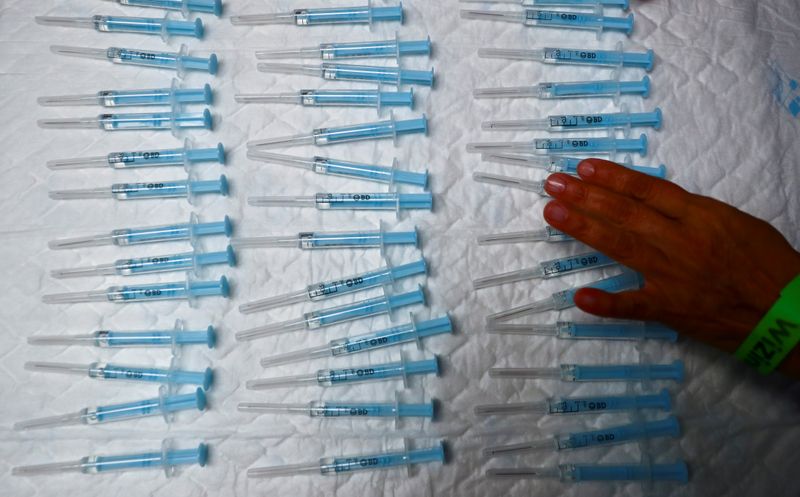By John Miller and Ludwig Burger
ZURICH (Reuters) - Europe's drug regulator on Wednesday said it had found a possible link between AstraZeneca (NASDAQ:AZN)'s COVID-19 vaccine and very rare blood clots in adults who received the shot. Britain recommended people under 30 get an alternative COVID-19 vaccine if possible.
Here's what we know so far:
WHAT HAS HAPPENED?
The EMA said its vaccine side effects monitoring system, as of April 4, had received 169 reports of cases of cerebral venous sinus thrombosis (CVST), or clots in blood vessels exiting the brain, and 53 cases of splanchnic vein thrombosis (SVT), or clotting in veins in the abdomen.
That's out of some 34 million AstraZeneca vaccine doses administered in Britain and the European Economic Area since vaccinations started almost three months ago.
Its safety committee carried out a review of 62 cases of CVST and 24 cases of SVT, of which 18 were fatal.
Most of the cases reported have occurred in women under 60, though that could be misleading. Germany and Britain say many more women received AstraZeneca's shot than men.
Most cases occurred within 2 weeks of the person receiving their first dose.
German vaccination officials who recorded 29 cases of CVST in women aged 20 to 59 who got the AstraZeneca vaccine said the occurrence rate in that group was 20 times higher within 16 days of vaccination than what would have typically been expected.
Germany's health ministry has said 1 to 1.4 cases of CVST would have been expected during that time.
WHAT HAS BRITAIN'S REGULATOR SAID?
The Medicines and Healthcare products Regulatory Agency reviewed 79 cases of rare clotting coupled with low platelets, with 19 fatalities - 13 women and 6 men. Eleven of the deaths in people under the age of 50 and three under 30.
All 79 cases occurred after a first dose of the vaccine.
HOW DID REGULATORS COME TO THEIR DECISION?
British officials drew on statistics from the University of Cambridge's Winton Centre for Risk and Evidence Communication to explain their recommendations that young people get an alternative shot while older people still get AstraZeneca's.
According to the Centre, vaccination with the AstraZeneca shot would reduce admissions to intensive care units by nearly seven in 100,000 people in the group aged 20-29 years old with high risk of exposure to the virus, while 1.1 people per 100,000 people in the same group were estimated as likely to suffer serious vaccine-related harms.
The risk of serious harm due to vaccination falls further the older people get, and ICU admissions prevented by vaccination rise sharply, boosting the AstraZeneca shot's benefit-to-risk ratio. The Centre concluded only 0.4 people for every 100,000 in the 50-59 age group would suffer vaccine-linked harm, while 95.6 ICU admissions per 100,000 people would be prevented.
EMA investigators checked if the frequency of events was higher in the vaccinated population than normal background rates drawn from public health statistics or insurance records. This would be combined with a medical analysis of each case and insight from scientific literature.
In its findings, the EMA said on March 18 that, on average, just 1.35 cases of CVST might normally have been expected among people under 50 within 14 days of receiving AstraZeneca's vaccine, whereas by the same cut-off date 12 cases had been recorded.
By comparison, four women out of 10,000 would get a blood clot from taking oral contraception.
Key to the EMA's assessment that benefits continue to outweigh risks are its conclusions about likelihood of an increased risk from clotting, compared with the benefits of preventing COVID-19 and reducing hospitalizations and deaths.
WHAT'S THE EU DOING NOW?
The EMA said that unusual blood clots with low blood platelets should be listed as very rare side effects and countries should decide on how to proceed with their national COVID-19 immunisation campaigns.
These may vary from nation to nation, the EMA said, depending on factors like how quickly infections are spreading and whether vaccines are available. Its safety committee requested new studies, and changes to ongoing ones, to provide more information about the mechanism behind the rare clots.
AstraZeneca and European regulators have said concerns about blood disorders did not emerge during clinical trials.
ARE THERE ANY THEORIES FOR WHAT MAY BE LEADING TO THE CLOTS?
Among possible causes for these rare cerebral sinous vein clots being investigated are that the vaccine triggers an unusual antibody in rare cases.
The EMA said the vaccine may trigger an immune response leading to the unusual clotting, though it acknowledged that scientists have yet to identify any risk factors that might predispose somebody to clotting combined with low platelets.
German scientists at Greifswald University concluded the vaccine is linked to the side effects, though their work still requires peer review. Andreas Greinacher, an expert on drug-induced immune responses, said specimens he has examined exhibited unusual antibodies that activate blood platelets, prompting the clots.

Greinacher is still seeking clues about why some people had clots and others did not.